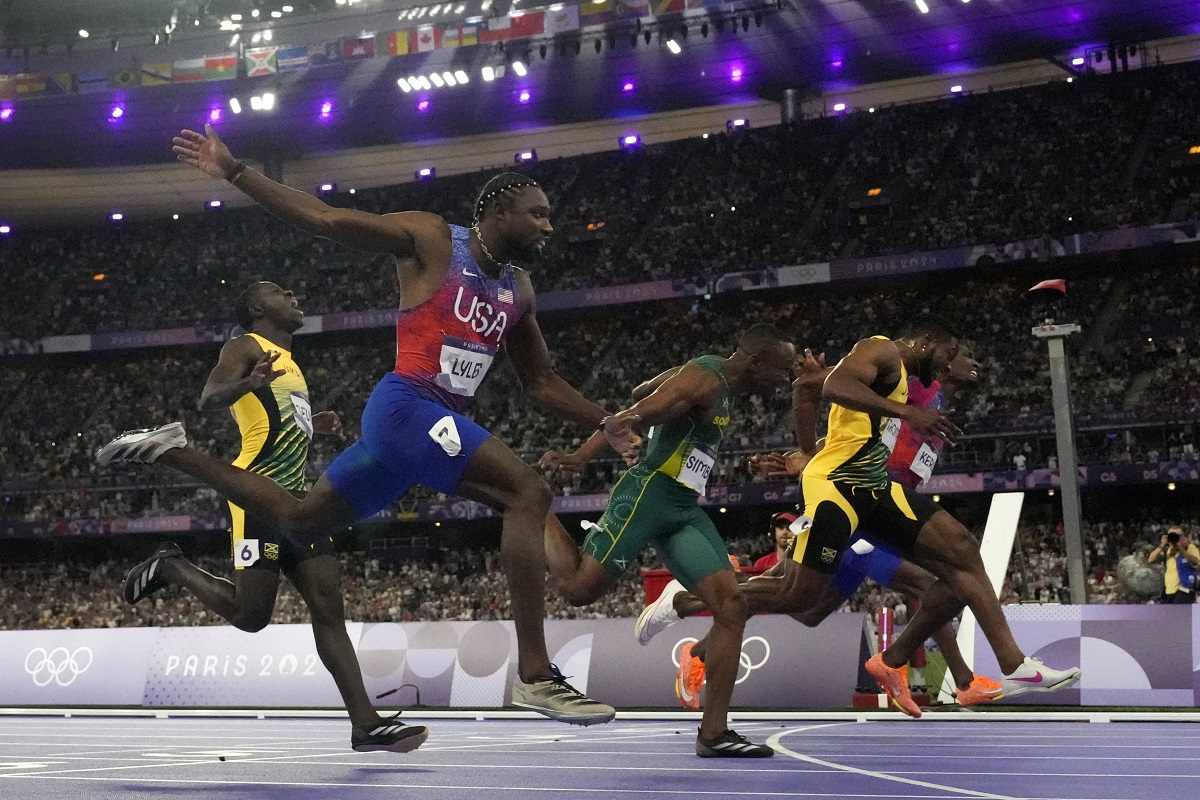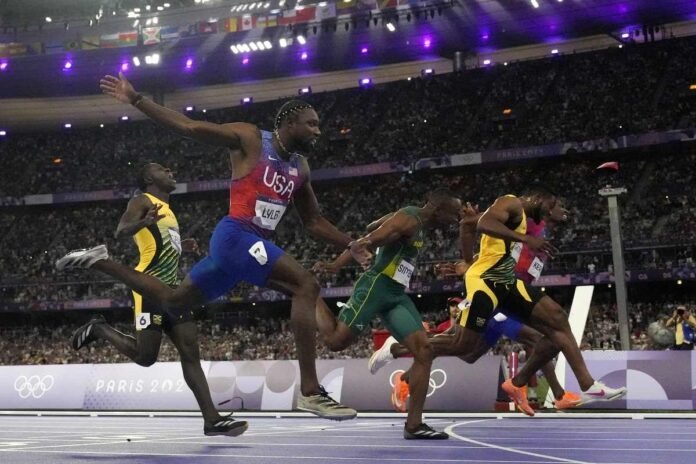Noah Lyles of the United States wins the men’s 100 meters final on lane seven during the 2024 Summer Olympics, Sunday, August 4, 2024 in Saint-Denis, France.
12:27 JST, August 5, 2024
SAINT-DENIS, France (AP) — Noah Lyles paced the end of the track, his hands folded atop his head, gazing wistfully at a scoreboard that would sooner or later display the answer he had been searching for for three sweat-soaked years.
Has all that effort since the last Olympics — all the work on the practice track and in the gym to find an inch or a millisecond here and there — really been worth it?
Ten seconds passed, then twenty. Then almost thirty. And then the answer appeared.
Yes, Lyles is the 100 meter champion at the Olympic Games in Paris. The fastest man in the world.
But not very much.

Noah Lyles of the United States (second from left) celebrates his victory in the men’s 100 meters final, ahead of Kishane Thompson of Jamaica, during the 2024 Summer Olympics, Sunday, Aug. 4, 2024, in Saint-Denis, France.
The American showman defeated Jamaica’s Kishane Thompson on Sunday by five thousandths of a second, or 0.005 seconds, in a race for the ages.
The final standings in this race: Lyles 9.784 seconds, Thompson 9.789.
The new champion said that one of his physiotherapists had assured him before he left for Paris that this race would be a narrow victory.
“He said, ‘This is how close the first and second are going to be,'” Lyles said, pinching his thumb and index finger together so they were almost touching. “I can’t believe how right he was.”
To put it into perspective, the blink of an eye lasts an average of 0.1 seconds, which was 20 times longer than the gap between the first and second.
It was a close call, when the sprinters crossed the finish line and the word “Photo” appeared next to the names of Lyles, Thompson and five others in the eight-man field, Lyles walked over to the Jamaican and said, “I think you have the Olympic dog.”
Thompson, who was three lanes to the left of Lyles and had no idea where he was on the track, was not convinced.
“I thought, ‘Wow, I’m not even sure because it was close,’” the Jamaican said.
Only time would tell. It always does. When Lyles’ name came up first, he ripped his name tag from the front of his bib and held it up. Moments later, he shouted at the TV camera, “America, I told you I could do this!”
The top four racers were separated by less than 0.03. The top seven all finished within 0.09 of each other.
American Fred Kerley came in third with a time of 9.81. “That’s probably one of the nicest races I’ve ever done,” he said.
In the photo finish, Kerley’s orange shoe crossed the finish line before anyone else, or anything. But it’s the chest that breaks the barrier that counts. Lyles’ chest crossed first.
This was the narrowest 1-2 finish in the 100 meters since Moscow in 1980 — or perhaps ever.
Back then, Britain’s Allan Wells narrowly defeated Silvio Leonard in an era when electronic timers didn’t go to thousandths of a second. The same was true in 1932, when Eddie Tolan won the first ever photo finish at the Olympics.
Lyles admitted that during the grueling wait, he was pretty sure he dropped his chest a little too early. It turns out dropping is one of the few things he doesn’t work on over and over again at his training facility in Florida.
“But I would say I have a pretty good history with dipping,” he said, recalling races he won in high school and as a junior.
The 9.784 was a new personal best for Lyles and made him the first American champion in this important race at the Olympics since Justin Gatlin in 2004.
Lyles hopes to go even bigger and perhaps take the sport back to the days when Carl Lewis and Edwin Moses set the track alight – a must-see event, as Lyles performed in front of an audience of some 80,000 on a warm evening at the Stade de France.
The mission began after Lyles settled for a bronze medal in Tokyo in his favorite — and then only — sprint, the 200. Those COVID-affected Games were a horrific experience for Lyles. He rededicated himself to improving his mental health, but also sought a new mission — the 100 meters and with it a shot at track immortality.
Training was tough for a sprinter never known as a great starter, but he persevered. When he won the world championship last year and then confirmed it by winning the 200, his goal for Paris was clearly in sight.
But when he entered the Olympic final, having finished second in both qualifying races, and found himself facing a sprinter who had been faster than him this year — Thompson — and another who had beaten him twice this year — Jamaica’s Oblique Seville — he knew this would be no coronation.
Thompson added to the hurdle when he let out a primal scream during the introduction, a scream Lyles often uses during his biggest races.
“I was like, ‘Man, that’s my thing, that’s crazy,’” Lyles said.
Lyles galloped and jumped about 20 yards down the track before returning to the starting line, where the runners waited about three minutes until the starting gun finally sounded.
It was worth the wait.
The question that can be debated for years is: what was the difference with this one?
Could it be that Lyles thought it was his speed and leaned toward the line, making him think it was mistimed?
Was it his ability to reach everyone in this straight line of sprinters over the first 60 meters? A skill he has worked on in the many training sessions since he took up the shorter sprint?
The answer: all that and much more.
“Everyone in the field came in knowing they could win this race,” Lyles said.
It took 9.784 seconds, and then another 30 seconds or so, before the name of the man who had actually done it appeared on the scoreboard.
“When I saw that name, I thought, ‘Oh my god, there it is!’” Lyles said.
Gold (and bronze) for Ukrainian high jumpers
Yaroslava Mahuchikh won Olympic gold in the high jump for her war-torn country Ukraine and had the added bonus of company. Her teammate Iryna Gerashchenko won bronze and the teammates skipped, jumped and bounded around the track, waving their blue and yellow flags in heartfelt celebration.
Mahuchikh needed fewer attempts to clear the winning height of 2 metres than Australia’s Nicola Olyslagers, adding the sport’s greatest prize — Olympic gold — to her world championship and world record.
Kerr vs Ingebrigtsen is a go for heated men’s 1500m
The greatest rivalry on the track reaches a climax on Tuesday when reigning world champion Josh Kerr of Great Britain takes on reigning Olympic champion Jakob Ingebrigtsen of Norway.
They faced each other again in the semi-final on Sunday, with Ingebrigtsen winning over the Briton. She looked at him twice as they raced across the finish line, winning the race that seemed to mean more than it should have, in a time of 3:32.38.
“They can expect one of the toughest, hardest 1500m races the sport has seen in a long time,” Kerr said.
Did Ingebrigtsen agree with this?
“It depends who you ask, maybe,” he said. “I mean, racing is what you want to make of it.”



